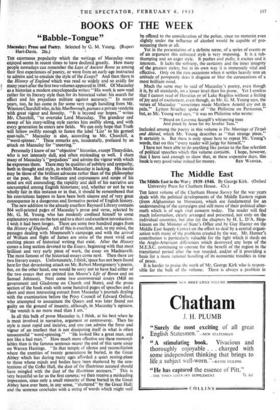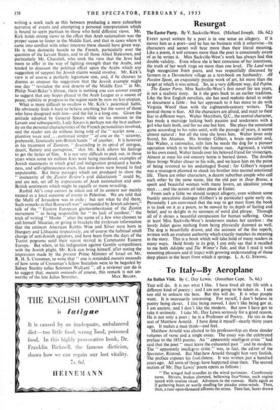The Middle East
THE latest volume of the Chatham House Survey for the war years deals with the political developments of the Middle Eastern region (from Afghanistan to Morocco), which are fundamental for an understanding of the campaigns and still more of their political after- math which is of such vital concern today. The reader will find much information, clearly arranged and presented, not only on the individual countries, but also (in the chapters by H. L. D 'A. Hop- kinson on the Minister of State's Office and by Guy Hunter on the Middle East Supply Centre) on the effort to deal by a central organi- sation with many of the problems created by the war. Mr. Hunter's contribution is particularly valuable for the light which it sheds on the Anglo-American differences which destroyed any hope of the M.E.S.C. continuing to operate for the benefit of the region in the transitional period after the war receded, and/or of it providing a basis for a more rational handling of its economic troubles in time of peace. It is harder to praise the work of Mr. George Kirk who is respon- sible for the bulk of the volume. There is always a problem in writing a work such as this between producing a mere colourless narrative of events and attempting a personal interpretation which is bound to seem partisan to those who hold different views. Mr. Kirk holds strong views to the effect that Arab nationalism was the proper cause to foster in the Middle East, and that in cases where it came into conflict with other interests these should have given way. He is thus distinctly hostile to the French, particularly over the question of the Levant States, and to all those Allied Statesmen, and particularly Mr, Churchill, who took the view that the Jews had more to offer in the way of fighting strength than the Arabs, and tended to discount the political effect upon the Arabs which any suggestion of support for Jewish claims would involve. Mr. Kirk's view is of course a perfectly legitimate one, and, if he chooses to dismiss as utopian the suggestion that the Jewish example might one day " revitalise the arid deserts of the Middle East " in Mr. Philip Noel-Baker's phrase, there is nothing one can answer except to suggest that any hopes placed in the Arab League as a source of peace, stability or progress in the region seem by now no less utopian.
What is more difficult to swallow is Mr. Kirk's polemical habit. He obviously finds it hard to believe anything but the worst of those who have disagreed with him—and the list is a long one. Given the attitude adopted by General Spears while on his mission to the Levant and subsequently, Lady Spears is perhaps not the best author- ity on the personal characteristics of the French personalities involved, and the reader can do without being told of the " scarlet nose ... plaintive voice and ... continual simper " of one or the " scrawny, prehensile, fanatically anti-British hands " another. It is however in his treatment of Zionism, " descending in its spiral of intrigue, deceit, flattery and corruption." that Mr. Kirk allows his feelings to get the better of him. It is not very difficult to pick out, in those years when some six million Jews were being murdered, examples of Jewish statements in which grief and indignation produced a harsh- ness, and self-righteousness even, that non-Jews were bound to find unpalatable. But these passages which are produced to show the " insincerity of the Zionist Review's arid didacticism " could be, and are not, set off by expressions of Arab nationalism and anti- British sentiments which might be equally or more revealing.
Rashid Ali's coup cannot be taken out of its context nor mainly treated as a local outcome of events in Palestine. We are told that the Mufti of Jerusalem was in exile ; but not what he did there. Such remarks as that Roosevelt was" surrounded by Jewish advisers," talk of the " Eastern European ghetto-inheritance of the Zionist movement " as being responsible for " its lack of candour," the trick of writing " Moshe " after the name of a Jew who chooses to call himself Maurice, or giving in brackets the irrelevant information that the eminent American Rabbis Wise and Silver were born in Hungary and Lithuania respectively, are of course the habitual small change of anti-Jewish agitators, and have been from the days of the Tsarist pogroms until their recent revival in Communist Eastern Europe. But when, in his indignation against Gentile sympathisers with the Jewish plight, Mr. Kirk can bring himself, after noting the impression made by the present Prime Minister of Israel on Mr. R. H. S. Crossman, to write that " one is reminded mutatis mutandis of how some of Crossman's fellow Socialists were to be beguiled by Sidney Stanley (alias Solomon Wulkan) ", all a reviewer can do is to suggest that, mutatis mutandis of course, this remark is not un- worthy of the late Julius Streicher. MAX BELOFF.



































 Previous page
Previous page